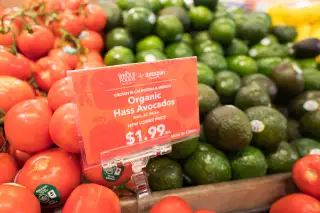Whole Foods Is Still Super Expensive, New Analysis Shows

Everyone predicted that Whole Foods prices would get cheaper when Amazon officially took over the supermarket chain, and this week it appeared as if the forecast was accurate. Yet despite some widely-acclaimed price cuts at Whole Foods, it looks like the upscale grocery store still deserves its old "Whole Paycheck" nickname.
On Monday, when Amazon's acquisition of Whole Foods was complete, Whole Foods stores introduced price cuts on products like organic apples, bananas, avocados, responsibly farmed salmon, lean ground beef, butter, baby kale, and almond butter. In some cases, the new prices represented significant savings—with cuts as big as 43% compared to before Amazon was in charge.
Does this mean Whole Foods is now a cheap place to go grocery shopping? Nope.
Reuters reported that Gordon Haskett Research Advisors analyst Charles Grom did a large pricing analysis of Whole Foods before and after Amazon took over, and what he found is that, with a few notable exceptions, Whole Foods prices have barely nudged. Grom looked at more than 100 products at a Whole Foods location in Princeton, N.J., and compared their prices this week to last week. Prices on 78% of the products in the analysis did not change at all. Overall, the average price decline for all of the items was only 1.2%.
“Amazon appears to be taking a page out of the old Wal-Mart playbook on the price action front – that is, announcing a plethora of price actions that on the surface look deep, but in reality only reveal modest reductions,” Grom wrote in a note to clients.
According to Grom's analysis, some items at Whole Foods actually received price hikes over the past week. A box of Annie’s Mac and Cheese went from $1 to $2.19, and prices increased nearly 5% overall in the "dry grocery and baking items" category.
Previous shopping studies have shown that Trader Joe's prices are roughly 20% cheaper than Whole Foods when comparing similar items. Grocery prices at the likes of Wal-Mart and Aldi are often cheaper still, yet many would argue that these aren't apples-to-apples comparisons because Whole Foods adheres to high quality standards.
Generally speaking, then, the main reason that shoppers should buy their groceries at Whole Foods is because they like the selection and quality. That was the biggest reason people shopped at Whole Foods before Amazon bought it, and it remains the best argument for shopping there now. If you want to save money, you should still be doing most if not all of your grocery shopping somewhere else.